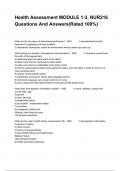Health Assessment MODULE 1-3, NUR216
Questions And Answers(Rated 100%)
What are the two types of interviewing techniques? - ANS 1) standardized formats-
framework of gathering info about patient
2) therapeutic techniques- create an environment where patient can open up
What should you include in therapeutic communication? - ANS 1) introduce yourself and
the parts of the assessment
2) determine what the client wants to be called
3) allow more time for reponses for older adults
4) make sure client is comfortable (room temp, chair)
5) start by asking about health history general surgery, and vital signs in order to move on to
more sensitive parts
6) reduce environmental noises
7) interpretive services for clients with language barriers
8) note body language, eye contact and tone of voice
9) avoid using term that patient doesn't know (start at fifth grade level)
What does demographic information include? - ANS 1) name, address, contact info
2) birth date, age
3) gender
4) race, ethnicity
5) relationship status
6) occupation , employment status
7) insurance
8) emergency contact info
9)family, other living at home
10) advance directives
What are the major health history components? (8) - ANS 1) demographic information
2) source of history
3) chief concern
4) history of present illness
5) past health history and health status
6)family history
7)psychosocial history
8) health promotion behaviors
, What is the source of history? - ANS whether the client, family, friends, other med
records, other providers
-make sure source is reliable
Chief concern - ANS why the patient is seeking care
history of present illness? - ANS -detailed chronological description of why the client is
seeking care
- details about the manifestations such as location, quality, quantity, setting, timing, precipitating
factors, alleviating or aggravating factors,
Past health history and current health status - ANS -childhood illnesses (communicable
and chronic)
-medical, surgical, obstetrical, gynecological, psychiatric history
-current immunization status
- allergies to medications
-habits and lifestyle patterns
What are some therapeutic communication techniques? - ANS -active listening: show
clients that you have their undivided attention
-open-ended questions
-clarifying: question clients about specific details in greater depth or direct them towards
relevant parts of their history
-back channeling: "go on" "tell me more"
- probing: "what else would you like to add to that?"
- closed-ended questions:
-Summarizing: validate accuracy of the story
family history - ANS -health information about parents,siblings,children, grandchildren
-family structure, support system function
- current ages or age at death, acute and chronic disorders of family members
psychosocial history: - ANS relationships, support systems, concerns about living or work
situations, financial status, ability to perform activities of daily living
Health promotion behaviors - ANS -exercise/activity, diet, sun exposure, wearing of safety
equipment, substance use, environmental exposures, home environment, resources, stress,
sleep patterns
-awareness of risky for heart disease, cancer, diabetes mellitus, stroke
Questions to ask about integumentary system: - ANS -do you have any skin diseases?
-do you have any itching, bruising, lumps, hair loss, nail changes or sores?
-do you have any allergies?
-how do you care for you hair skin and nails?




